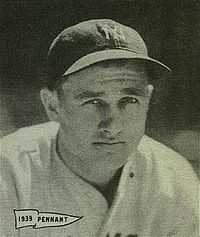Jake Powell
| Jake Powell | |||
|---|---|---|---|
 | |||
| Outfielder | |||
|
Born: July 15, 1908 Silver Spring, Maryland | |||
|
Died: November 4, 1948 (aged 40) Washington, D.C. | |||
| |||
MLB debut | |||
| August 3, 1930 for the Washington Senators | |||
Last MLB appearance | |||
| September 30, 1945 for the Philadelphia Phillies | |||
Career statistics | |||
| Batting average | .271 | ||
| Home runs | 22 | ||
| Runs batted in | 327 | ||
Teams | |||
| |||
Alvin Jacob Powell (July 15, 1908 – November 4, 1948), was an outfielder for the Washington Senators (1930, 1934–36 and 1943–45), New York Yankees (1936–40) and Philadelphia Phillies (1945).
Career
Powell helped the Yankees win the World Series every year from 1936 to 1939 and batted .455 in the 1936 series. In eleven seasons, he played in 688 games and had 2,540 at bats, 353 runs, 689 hits, 116 doubles, 26 triples, 22 home runs, 327 RBI, 65 stolen bases, 173 walks, a .271 batting average, .320 on-base percentage, .363 slugging percentage, 923 total bases and 43 sacrifice hits.
On July 29, 1938, in a pregame radio interview, Chicago White Sox broadcaster Bob Elson asked Powell how he stayed in shape during the offseason. Powell responded, "Oh, that's easy. I'm a policeman, and I beat niggers over the head with my blackjack." Powell was not a police officer in the offseason.[1] After a surge of public outrage, including calls that Powell be banned for life, baseball commissioner Kenesaw Mountain Landis suspended Powell for ten games.[2] Powell also went on a walking tour of Harlem to apologize personally to fans of the Yankees.[1]
Powell played in 31 games in 1939 and 12 games in 1940 before the Yankees sold him to the minor leagues.[2]
In the fall of 1944, during World War II, Powell served as an emergency police officer in Montgomery County, Maryland. He returned to baseball at the start of the 1945 season.
In 1948, Powell tried to make a comeback, playing in 31 games for the Gainesville G-Men of the Florida State League, but batted just .220.
In November 1948, Powell was arrested in Washington, D.C. for passing bad checks. He drew a revolver while at a police station and committed suicide.[2]
References
External links
- Career statistics and player information from Baseball-Reference, or Baseball-Reference (Minors)
- Chris Lamb, "A Public Slur in '38 Laid Bare The Game's Racism", The New York Times, July 27, 2008.